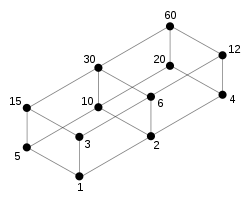Unitary divisor
In mathematics, a natural number a is a unitary divisor of a number b if a is a divisor of b and if a and  are coprime, having no common factor other than 1. Thus, 5 is a unitary divisor of 60, because 5 and
are coprime, having no common factor other than 1. Thus, 5 is a unitary divisor of 60, because 5 and  have only 1 as a common factor, while 6 is a divisor but not a unitary divisor of 60, as 6 and
have only 1 as a common factor, while 6 is a divisor but not a unitary divisor of 60, as 6 and  have a common factor other than 1, namely 2. 1 is a unitary divisor of every natural number.
have a common factor other than 1, namely 2. 1 is a unitary divisor of every natural number.
Equivalently, a given divisor a of b is a unitary divisor if and only if every prime factor of a has the same multiplicity in a as it has in b.
The sum of unitary divisors function is denoted by the lowercase Greek letter sigma thus: σ*(n). The sum of the k-th powers of the unitary divisors is denoted by σ*k(n):
If the proper unitary divisors of a given number add up to that number, then that number is called a unitary perfect number.
Properties
The number of unitary divisors of a number n is 2k, where k is the number of distinct prime factors of n. The sum of the unitary divisors of n is odd if n is a power of 2 (including 1), and even otherwise.
Both the count and the sum of the unitary divisors of n are multiplicative functions of n that are not completely multiplicative. The Dirichlet generating function is
Odd unitary divisors
The sum of the k-th powers of the odd unitary divisors is
It is also multiplicative, with Dirichlet generating function
Bi-unitary divisors
A divisor d of n is a bi-unitary divisor if the greatest common unitary divisor of d and n/d is 1. The number of bi-unitary divisors of n is a multiplicative function of n with average order  where[1]
where[1]
A bi-unitary perfect number is one equal to the sum of its bi-unitary aliquot divisors. The only such numbers are 6, 60 and 90.[2]
References
- Richard K. Guy (2004). Unsolved Problems in Number Theory. Springer-Verlag. p. 84. ISBN 0-387-20860-7. Section B3.
- Paulo Ribenboim (2000). My Numbers, My Friends: Popular Lectures on Number Theory. Springer-Verlag. p. 352. ISBN 0-387-98911-0.
- Cohen, Eckford (1959). "A class of residue systems (mod r) and related arithmetical functions. I. A generalization of Möbius inversion". Pacific J. Math. 9 (1). pp. 13—23. MR 0109806.
- Cohen, Eckford (1960). "Arithmetical functions associated with the unitary divisors of an integer". Mathematische Zeitschrift 74. pp. 66—80. doi:10.1007/BF01180473. MR 0112861.
- Cohen, Eckford (1960). "The number of unitary divisors of an integer". American mathematical monthly 67 (9). pp. 879—880. MR 0122790.
- Cohen, Graeme L. (1990). "On an integers' infinitary divisors". Math. Comp. 54 (189). pp. 395—411. doi:10.1090/S0025-5718-1990-0993927-5. MR 0993927.
- Cohen, Graeme L. (1993). "Arithmetic functions associated with infinitary divisors of an integer". Intl. J. Math. Math. Sci. 16 (2). pp. 373—383. doi:10.1155/S0161171293000456.
- Finch, Steven (2004). "Unitarism and Infinitarism".
- Ivić, Aleksandar (1985). The Riemann zeta-function. The theory of the Riemann zeta-function with applications. A Wiley-Interscience Publication. New York etc.: John Wiley & Sons. p. 395. ISBN 0-471-80634-X. Zbl 0556.10026.
- Sándor, József; Mitrinović, Dragoslav S.; Crstici, Borislav, eds. (2006). Handbook of number theory I. Dordrecht: Springer-Verlag. ISBN 1-4020-4215-9. Zbl 1151.11300.
External links
OEIS sequences
| ||||||||||||||||||||||||||||





